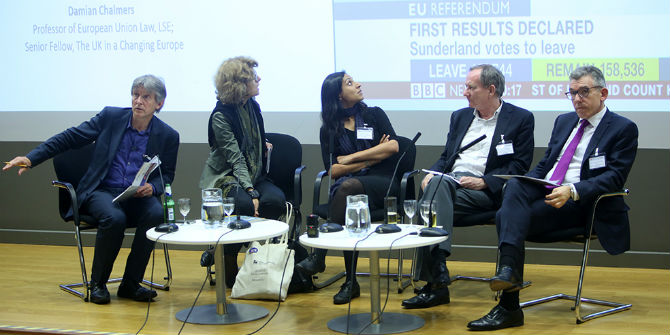 Our regular columnist Matthew Goodwin offers an update on the recent public opinion dynamics regarding Brexit and shows there is little evidence that the Leave side has made progress in 2015. He also looks at the role political elites and the issue of immigration may play in shaping the referendum outcome in the year to come.
Our regular columnist Matthew Goodwin offers an update on the recent public opinion dynamics regarding Brexit and shows there is little evidence that the Leave side has made progress in 2015. He also looks at the role political elites and the issue of immigration may play in shaping the referendum outcome in the year to come.
This time next year Britain may have decided to Remain in or Leave the EU. So, how is the race looking as we enter 2016? In the Poll of Polls Remain continues to hold a significant 8 point lead.
Remain is on 54%. Leave is on 44%.
If you include people who do not know how they will vote, and look at the average across December, then Remain is 47%, Leave is 38% and Don’t Know is on 15%.
This is especially true in the telephone polls, as explained here. If the Leave camp are to close the gap, then as things stand they need to attract a majority of the undecided, make sure they vote and hope that a few events go their way.
Their challenge is also brought into focus by comparing these numbers to those in the early months of 2015, between January and the general election in May. This reveals that, since the beginning of 2015, the average Remain vote has increased by three points, the average Leave vote has fallen by one point and Don’t Know has increased by four.
This is a crude measure but it adds to the message in the last briefing – there is little evidence, if any, that the Leave camp has made progress. As I wrote here, given everything that has been happening in the wider environment – the refugee crisis, net migration, terrorist attacks – this should worry the Leave camp. Research on referendums suggests that the change option needs to hold a solid lead over the status quo before the short campaign gets underway. Currently, they have no such lead. A new Chatham House podcast with John Curtice goes into the numbers in more depth.
Drilling down: Lord Ashcroft’s research
Recent weeks also saw the release of new research on more than 20,000 voters by Lord Ashcroft. Overall, and using a thermometer scale, he found that 38% were leaning toward Remain, 47% were leaning toward Leave and 14% identified themselves as completely undecided.
Some take home points for me. Those leaning towards Leave appeared slightly more motivated to vote, but the differences were not as great as some campaigners claim (less than one point separated them in a likelihood to vote scale).
And while people were fairly split over whether the greater risk lay with Remaining or Leaving, the undecideds broke more heavily to viewing Brexit as the greater risk (by a 61-39 margin). This could be one of those findings we come back to after the vote.
But perhaps more than anything, Lord Ashcroft’s research underscored the crucial role that David Cameron is likely to play.
We know from wider research that the ‘cues’ or ‘signals’ that leaders provide during elections or national referendums can make a big difference. And this appears to hold true for Britain’s referendum.
Just look at the numbers. When presented with the idea that Cameron has announced he has secured a better deal for Britain (which he inevitably will) and is recommending that Britain Remain in the EU, 35% of all voters would be more inclined to Remain (35% of undecided voters and 27% of those leaning toward Leave say that such a scenario would also tilt them to Remain).
This should be seen alongside regular polling from YouGov and others, which suggests that when Cameron (a) claims he has a good deal and (b) recommends that Britain remain, public support for doing so increases significantly – and well into a majority position.
All of this provides a major challenge for the Leave camp, who do not currently have a figurehead who is appealing and powerful enough to neutralise this effect. This is no doubt why some prominent Outers are now calling on Eurosceptic top Tories to get off the fence. They will need more than Liam Fox.
Moreover, the Leave camp will somehow need to find a way of framing Cameron’s renegotiation as a failure while also recognising the fact that very few voters are actually paying attention to the nitty-gritty detail. As Lord Ashcroft’s focus groups makes clear, while most people are broadly aware that Cameron is involved in a renegotiation “very few had any idea what his demands were or how they would be received”. Devoting considerable energy to explaining each of the policy areas to voters who typically turn off from such detail might not be the best way forward. Read the full study.
Immigration and the referendum

The above point brings us to some more new research on the referendum. Drawing on a range of reliable data, Geoffrey Evans and Jon Mellon demonstrate how immigration concerns have become central to public opposition to the EU – and far more so than they were in 1974.
In 2015, they note, only one in ten people who feel broadly at ease with the number of migrants in Britain would vote to leave the EU while half of those who feel anxious about immigration would vote for a Brexit. In 1975 there was no such relationship.
“Clearly”, write Evans and Mellon, “the link between concern about immigration and a negative view of the EU has strengthened considerably in the years following the opening access to immigrants from the 2004 accession countries. The relevance of this relationship for the forthcoming EU referendum is inescapable”.
This research should be read alongside a new briefing paper which draws similar conclusions, noting how anxiety over immigration is a key driver of the Leave vote.
Other evidence-based blogs:
Public opinion and the referendum – a summary by Lord Ashcroft
If you want Britain to Leave, these numbers should worry you – Matthew Goodwin
Poll excitement intensifies the spotlight on renegotiation – John Curtice
Brits know less about the EU than anyone else – Simon Hix
And in case that’s not enough, the LSE has assembled its own Year in Review.
This post is an edited version of Matthew’s bulletin, A round-up of research on Britain’s EU Referendum.
The article gives the views of the author, and not the position of the LSE BrexitVote blog, nor of the London School of Economics and Political Science.
Matthew Goodwin is Professor of Politics in the School of Politics and International Relations at the University of Kent, and Associate Fellow at Chatham House. He is also a senior fellow at the UK in a Changing Europe project. His most recent book is the co-authored Revolt on the Right: Explaining Support for the Radical Right in Britain (2014). @GoodwinMJ






